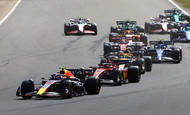Announcement is expected soon as Porsche reportedly set to buy 50% stake in Red Bull F1 team
The long-expected Formula 1 partnership between Red Bull and Porsche looks set to be confirmed.
Stories have emerged this week that the car maker will buy a 50% stake in Red Bull Technologies, the arm of the Austrian-owned, UK-based business that includes a new F1 engine factory that will be fully operational by the end of the year. Finally, Porsche’s anticipated return to grand prix racing will become a reality.
An announcement of the partnership has been delayed largely because F1’s new engine regulations, set to be introduced in 2026, haven’t yet been signed off and made official. That is due to happen in August and will finally signal a green light for the Volkswagen Group to take a plunge that it has studiously avoided for decades.
But before the deal is confirmed and made official, how the partnership will work raises plenty of juicy, fundamental questions. The most prominent: how much control will Porsche have over the operation of the F1 team, currently soaring towards a second consecutive drivers’ world title with Max Verstappen and a first constructors’ crown for nearly 10 years? Red Bull has thrived as a proudly independent entity since its first entry into F1 as a constructor in 2005. That ‘indie’ status will end whenever this deal kicks in.
Red Bull has had manufacturer relationships before, most recently with Honda, which ended with the manufacturer’s withdrawal from F1 at the end of last season. That was a harmonious relationship, from which Red Bull negotiated to take over Honda’s F1 proven and eventually successful engine IP (intellectual property), which is why it has remained so seamlessly competitive this season. But its other big manufacturer relationship, with Renault, was fractured so badly – despite a string of four consecutive world titles together with Sebastian Vettel between 2010 and 2013 – that bridges were well and truly burned. Returning to Renault power was barely an option when Honda made its call to pull out.
Team principal Christian Horner, head engineer Adrian Newey and driver-management chief Helmut Marko are the architects of Red Bull’s success, under the patronage of brand owner Dietrich Mateschitz, and take a hard-headed, no-compromise approach to F1 – which is precisely what is required. F1 teams don’t work as democracies, as we’ve seen time and again. Big characters with power and a clear vision of how to win succeed in motorsport – and they don’t take kindly to sharing their responsibilities with car manufacturer executives.
Porsche is a very different organisation to Honda, which was willing to leave Red Bull largely to its own devices in its operation of the F1 team. It’s hard to imagine the same will be true when this new relationship begins. Tensions seem inevitable. So how will the two organisations integrate within a partnership?
I asked Horner that question directly during a pre-season visit to Red Bull, by which time the talks with Porsche were well advanced. “It would need to be exactly that: a partnership,” he said, without expansion – probably because he has been trying to work that out himself. He knows how tricky it will be. So might it spell the beginning of the end of his own long and successful time at the team? And what about the famously spiky and outspoken Marko? Won’t Porsche demand a say in who drives the cars it is powering and (partly) paying for? Then there’s Newey, who hates to be crowded. Interfere with his technical departments at your peril. His future will become a point of speculation too.
Other questions: the deal is said to be a long one, as you would expect, stretching for perhaps 10 years. But how long before Porsche wants to take full ownership of its F1 interests? The Honda IP that Red Bull currently operates: will that pass directly into Porsche’s hands? Can that be the case? And how much of a Porsche will it be if the car and engine are both built in Milton Keynes? On that one, it has worked well for Mercedes-AMG, whose F1 cars are made in Brackley and the powertrains in Brixworth, both in the heart of England, so that’s probably surmountable. But how much direct input will Porsche have in the programme? This can’t and won’t be a simple badging exercise, because that won’t wash for such a company.
Questions, questions… But it will also be fantastic news for Red Bull, Porsche and F1 as a whole when it’s made official. Such a brand, which trades on its sporting traditions, absolutely should be represented at the pinnacle. It’s beyond time. And for Red Bull, the astonishing amount of investment the company has made in F1 – given that its primary business is to manufacturer and sell an energy drink – has been a significant burden. The team has aggressively chased commercial sponsorship to pay for the new powertrain department and a staff level that Horner told us could reach 400. Sharing that burden with a major manufacturer will reduce that pressure and only enhance the company’s future opportunities and potential. It completely makes sense for this proud organisation, while for Porsche, avoiding the pain of starting an F1 programme from scratch and joining forces with such a team almost guarantees it will come in with a bang. Expectations will – and should – be high.
Explosive news, then (when it’s confirmed). What happens next will be fascinating.
Source: Autocar
